I hate to jump on bandwagons, but try and do a little research before you say stuff like that. Otherwise, I'll just forget this ever happened, mainly since'll probably do something like this one day.
Let the ruling classes tremble – an Interactive Revolutionary AAR
- Thread starter Tommy4ever
- Start date
-
We have updated our Community Code of Conduct. Please read through the new rules for the forum that are an integral part of Paradox Interactive’s User Agreement.
You are using an out of date browser. It may not display this or other websites correctly.
You should upgrade or use an alternative browser.
You should upgrade or use an alternative browser.
- Status
- Not open for further replies.
And a lot of support towards Communism. About comparison with this AAR, in fact, there is more White insurgence than in OTL.
And what if a lot of support came from Catholics? Any religion fight against atheist ideas, and, in Spain, the core of Anticommunism wasn't only the Church. There was a tradition of reaction against any progresist ideas since 1812.
PS: It is a very Catholic nation.
So was Cuba and various other communist states that were targeted by large scale outside efforts to destabilize them. If anything, I'd suggest that communism was more successful in the catholic world then in the protestant world.
The actions of two individuals can hardly be considered representative of the Socialist movement as a whole.
Fair enough, it was an assumption. But its not propaganda and not very ignorant an assumption if it was an idea spread and practiced by influential members of the movement.
I didn't really think someone would find the idea offensive: it makes sense in some circles. Some people feel that keeping the severely handicap alive is a waste of resources. Some think the aged should have the right to suicide. With the emotional attachment out of the way, ritual suicide would be a way for a Party to know that the people are loyal to them, eventually becoming a desired cultic practice toward the state; much like life in Imperial Japan.
I find it funny that when a topic comes up that might bring bad publicity to their point of view, everyone starts beating their chest in lamentation: "Oh no, oh no; blasphemy!" When, really, the idea is not unheard of and its morality is not black and white to some people.
Last edited:
Fair enough, it was an assumption. But its not propaganda and not very ignorant an assumption if it was an idea spread and practiced by influential members of the movement.
I didn't really think someone would find the idea offensive: it makes sense in some circles. Some people feel that keeping the severely handicap alive is a waste of resources. Some think the aged should have the right to suicide. With the emotional attachment out of the way, ritual suicide would be a way for a Party to know that the people are loyal to them, eventually becoming a desired cultic practice toward the state; much like life in Imperial Japan.
I find it funny that when a topic comes up that might bring bad publicity to their point of view, everyone starts beating their chest in lamentation: "Oh no, oh no; blasphemy!" When, really, the idea is not unheard of and its morality is not black and white to some people.
What do said aged people think of these ideas? They have every right and reason to be offended by the idea and I'm sure many are.
Also, this wouldn't discredit the Marxist POV as it is not a socialist ideal.
Yeah, the whole old people euthanasia makes us look like Enewald, so let's drop the subject?
What do said aged people think of these ideas? They have every right and reason to be offended by the idea and I'm sure many are.
Also, this wouldn't discredit the Marxist POV as it is not a socialist ideal.
I've been asked many a times by older persons "you'd die for your country, wouldn't you?!" I assume this means they would if they could.
I don't understand why Marxism could not touch on thoughts that were non-socialist. If I were trying to discredit Marxism, I wouldn't be asking if they encourage ritual suicide or if they didn't approve of pensions for the elderly. Ritual suicide doesn't sound far fetched when you consider that almost all communist states have a history of state worship and cults of personality; again, think back to Imperial Japan. I heard that its what they taught, so I was inclined to believe it. The fact that some Marxists practiced ritual suicide further led me to believe it.
This really isn't the place to discuss this. I made a mistake, and there you go.
Ritual suicide doesn't sound far fetched when you consider that almost all communist states have a history of state worship and cults of personality; again, think back to Imperial Japan.
This implies that Imperial Japan was Communist. Also, let's not forget that this AAR is set long before any of those state-worshipping regimes came into existance, so it's completely plausible that they won't exist in this timeline.
Agreed.Yeah, the whole old people euthanasia makes us look like Enewald, so let's drop the subject?
The VSVR 1890-1895
When compared with what went before Luxemburg’s first tenure as Chairman was quite incredible for its stability. With Bernstein and Martov always pushing for peace and arbitration in international affairs relations with the capitalist world cooled significantly. Meanwhile economic problems started to die away. Rosa did benefit from seeing the late-Leninist stimulus of industry come through with increased capacity but the Council Communist method seemed to be a reasonable if unspectacular success economically but a major coup politically. Elsewhere the First International continued to expand abroad.
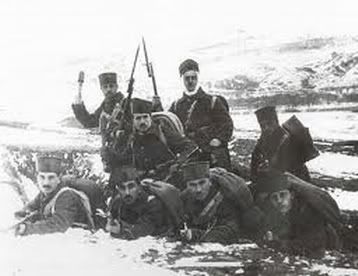
However Socialism did meet with failure during this period – most notably in the Bosnian War. In March 1890 the CSR declared war on the Republic of Bosnia with the aim of adding the country as a constituent Republic of the CSR. However, what should have been an easy victory, turned into a long and bitter struggle. The Bosnian Army did not once defeat the CSR forces in a pitched battle but using guerrilla tactics the Bosnians managed to hold the Turks back East of Sarajevo. Whilst the CSR struggle in combat its relationship with the VSVR was seriously strained. The aggressive action taken by the CSR was seen as a direct provocation of Russia and Austria-Hungary around the world and both Imperialist powers mobilised their troops. Neither Socialist Republic was ready for war with these two powers and the VSVR was forced to send out Zetkin on an emergency diplomatic tour to save Europe from war. Being seen as a dove in VSVR politics had always been a damaging thing and Luxemburg’s support for peace in the Bosnian Crisis severely damaged her position – allowing for a major bounce in Marxist-Leninist support. The VSVR (who had 24,000 men in the CSR) was not invited to support the Turks in Bosnia which prolonged the struggle. In January 1893 the CSR Army made a major breakthrough as it finally destroyed the Bosnian Army and brought Sarajevo under siege. Vienna replied to this by agreeing to an alliance with Bosnia and sending a large army in from the West. In July, with its Army retreating into the Bulgarian Republic, the CSR surrendered and agreed to a peace treaty.
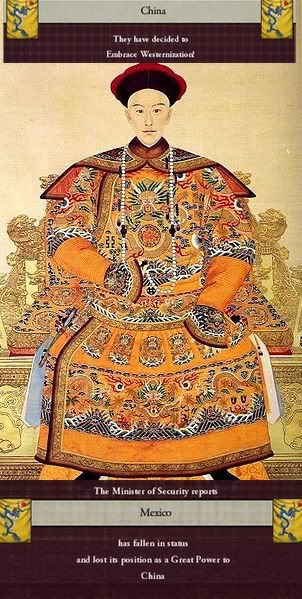
Outside of the Comintern there were several major changes around the world. In July 1890 the 19 year old Emperor Guangxu was elevated to total power after a coup against the Dowager Empress Cixi by pro-reformists took place. Cixi was exiled and the reformists quickly set about adapting China. In December China overtook Mexico to take a place among the Great Powers of the World.
The rise of this new superpower provided a mixed reaction in the Comintern. Firstly it effectively ended hopes that the Socialist movement in Indochina could actually meet with meaningful successes, however there was a better chance of a communist movement growing in China if the country started to industrialise. In Realpolitik terms the new power was a good thing for the VSVR. Russian, British and American hopes of economic dominion over the innumerable consumers of China had ended and now Britain would have to place a much greater emphasis on India – loosening British interference West of Delhi.
Just as China arose as a major world player France went through yet more turmoil. The Second Republic had been formed in 1885 and in the Republic’s first elections the moderately liberal Republican Party achieved a majority in the French Parliament – allowing them to govern the country. Since then French industry had totally stagnated and many areas of the country had seen their factories close (unemployment was now rife in the Rhone Valley and the North of the country). At the same time both of France’s two main political parties (the Republicans and the French Workers’ League) had experienced splits. Firstly, and less severely, the Radical Party had been formed by members of the Republican Party who were unhappy about a perceived drift to the Right by the Republicans. As much as this was painful for the Republicans the FWL’s split was considerably more damaging. Despite calls from Cologne for less extremism in the Comintern the FWL had maintained its fiercely revolutionary principles and continued to hold a large supply of arms (which had been coming in from the VSVR under Lenin’s tenure). The extremism of the FWL frightened a large section of the French proletariat as well as many party members themselves. In 1888 the Socialist Party was formed by the moderate members of the FWL and many other socialists who had refused to join the FWL in the first place.
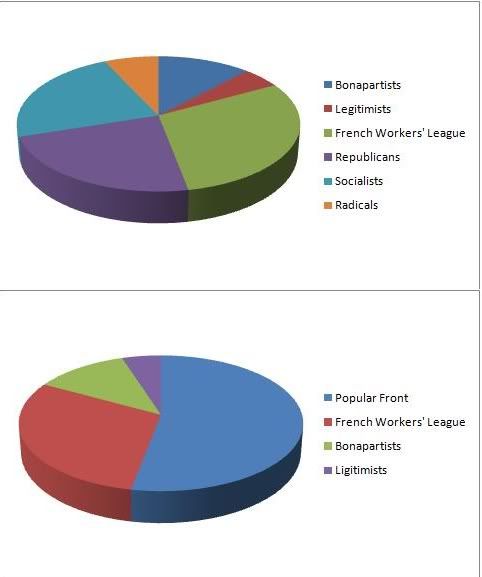
In the election of 1890 the FWL secured 30% of seats, the Republicans and Socialists both 23%, the Radicals 7% and the two Monarchist groups 17% between them. Initially the FWL had expected to form a coalition with the Socialists; however the Socialist Party shocked France by instead turning Right and joining with the two liberal parties to form the Popular Front (with 53% of seats). The new government alienated both Socialists and Republicans and terrified Right wingers who saw a swathe of social reforms passing through government and worse still a detente with the VSVR.
In September one ‘’Prince’’ Napoleon (son of the once influential Louis-Napoleon and heir to the Bonapartist dynasty) arrived at Calais from London to take charge of a military coup de tat that aimed to overthrow the Popular Front. The coup failed as the Bonapartists were unable to capture Paris (fended off by a mixture of local civilians and a few pro-government military formations). Despite failing to take Paris the Bonapartists were still able to bring the city under siege. Elsewhere the FWL, fearing a Bonapartist restoration and seeing a chance to take power, launched a colossal rebellion across France. In November Philip ‘’VIII’’ (son of the former King Philip VII) landed in the Vendee region (the heart of Legitimist support) with several thousand mercenaries and quickly cobbled together an army with which he marched towards Paris.
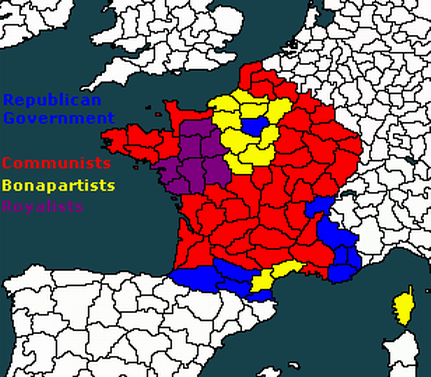
In early 1891, at the low tide of government power, virtually all of European France had been lost to one of the three rebel groups. When over 100,000 pro-government soldiers arrived from Algeria in March the tide began to turn swiftly against the rebels. The poor treatment of rural citizens by every rebel group helped had momentum to the government as they swept back the rebellions. By the end of 1893 France’s latest Civil War was over but the country remained war ravaged, hopelessly unstable and economically stagnant.
Elsewhere the Socialist International marched onwards. Frustratingly however Luxemburg’s term started with Algeria becoming the first ever country to leave the Comintern as pro-French Islamists overthrew the communist government and pledged their support to the French.
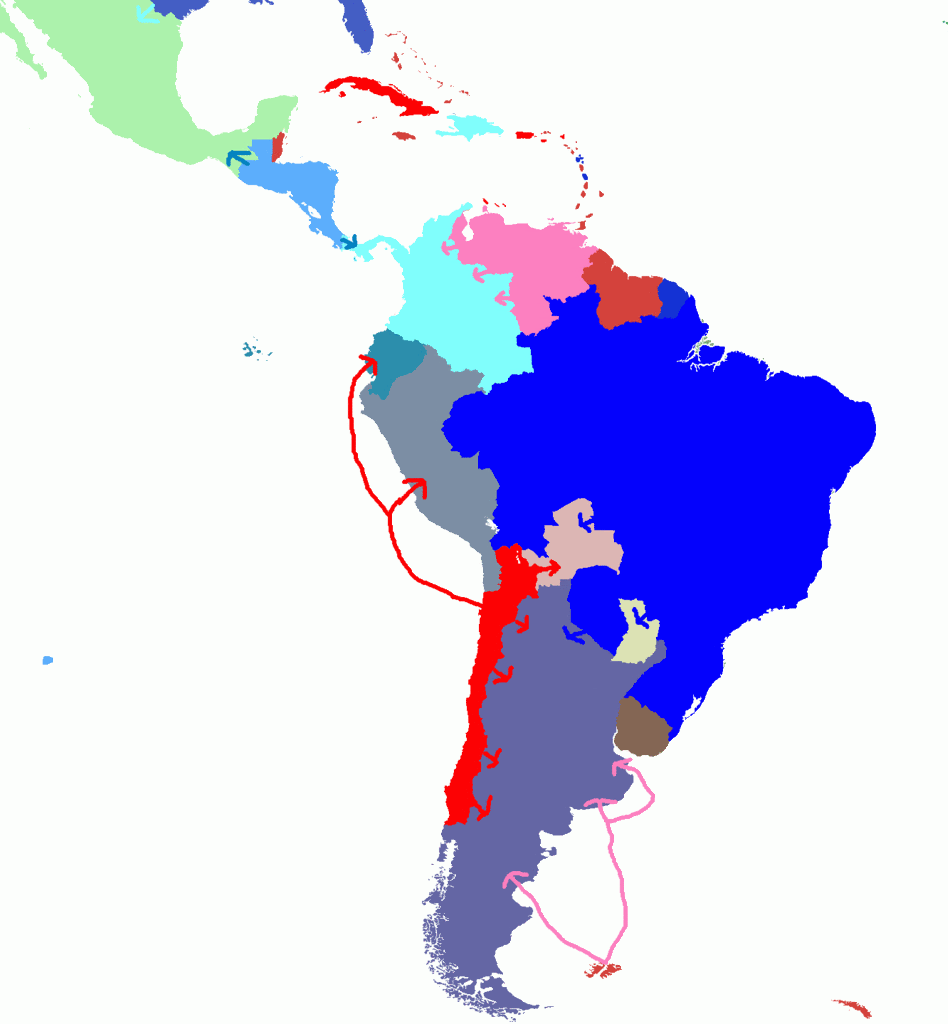
On September 15th 1891 the people of Chile awoke to a new, socialist, government as the communists won a landslide electoral victory. As mass VSVR support streamed into Chile Latin America seemed to finally be becoming the latest battlefield for the Great Powers. In the North both the USCA and USA were battling to gain influence in the recently deposed Great Power of Mexico. In the North of South America British influences from Venezuela competed with the USCA in breaking America’s extremely tenuous grip over Colombia. To the East French dominated Brazil was expanding its tentacles Westward – bringing it directly into conflict with the recently outstretching Socialist influences coming out of Chile. Finally Argentina was becoming a major battleground for the French, British and Comintern as each group fought hard to gain control over the agricultural breadbasket of the Pampas.
The VSVR met with a significant success in August 1894 when Bolivian Marxist revolutionaries deposed the pro-French military junta.
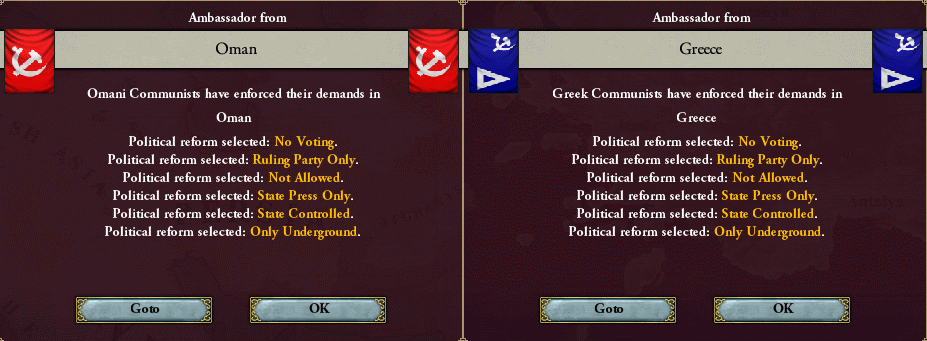
In 1892 and then January 1894 both the Greek and Omani people violently overthrew their Monarchs and established Socialist Republics.
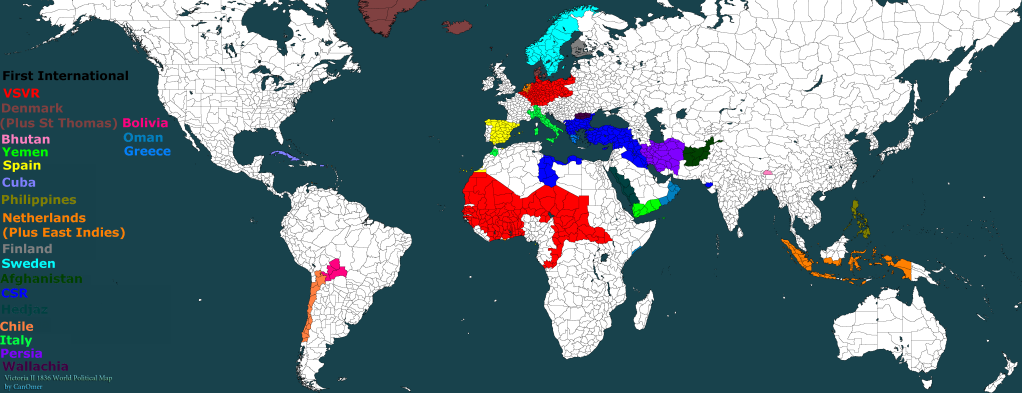
At the end of Luxemburg’s term the Comintern had expanded by a considerable amount. The most crucial new additions were in Latin America where socialism had exploded in popularity thanks to major Comintern support for the parties there and the successes of Chile and Bolivia.
For everything that happened abroad Luxemburg was elected on internal affairs and her term was always going to be remembered by what occurred within the Republic.
In industry and in the cities Luxemburg’s policies were a flying success. Whilst unemployment lingered at a reasonably high level for some years it was finally eliminated once more in late 1893. New unemployment subsidies were also introduced. Meanwhile industrial growth figures (whilst comparatively low in terms of percentage growth) were impressive in gross increase in production. Better still industrial subsidies grew at their lowest rate since the 1860s. Also, the African Continent experienced its first native industries as in several cities across the West of the Continent saw small industrial sectors spring up – all this was done thanks to investments made by local Communes in Europe towards their African brethren (the state encouraged this redistribution of wealth southward but did not make it a mandatory policy).
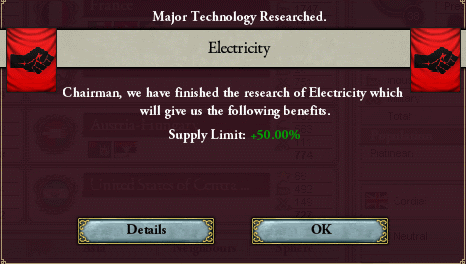
The Republic was, of course, helped on in this period by technological development – most notably the spreading of electrification in the VSVR. On top of this several new industries started to spring up. In Hannover factories created synthetic dyes to reduce VSVR reliance on imports, in the Ruhr new factories created electric gears and in Africa oil refining became, by far, the largest factory based industry (Africa had the advantage of greater proximity to the major oil producing areas that European VSVR).
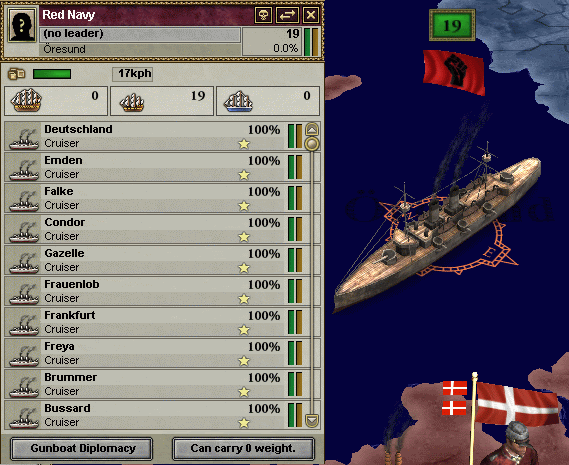
The new oil industries in Africa and Europe allowed the VSVR to become a sea faring nation once more as the first combat fleet of the Red Navy since the sinking of the steam ship based fleet by the British in the Eastern War was launched. The Fleet had initially been under construction in the early days of Lenin’s second term but a lack of funds and a strong supply of refined oil meant that the fleet could not be completed under Rosa’s tenure.
In terms of raw figures decentralised Council Communism was a decent, although unspectacular, success as has been discussed. In terms of popularity it was a great boon to the Luxemburgist-Democrat alliance. Within the cities at least the greater economic control over local fairs was greatly appreciated by the proletarians.
Hearing all this one might think that Luxemburg was the most popular Chairman ever. One would be mistaken.
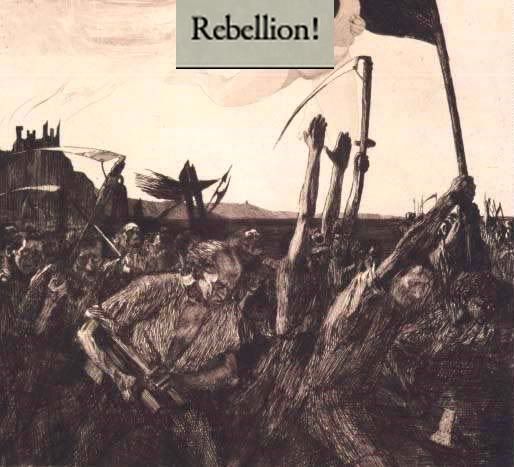
For it was during Luxemburg’s tenure that the great mass of the disposed, downtrodden, ignored and vilified class of the VSVR finally unleashed their anger upon the state in the Peasant Revolution of 1892. At first look the Luxemburgist-Democrat government was the most pro-farmer in the history of the Republic. Had they not granted them the right to vote? Had they not given them great economic control in the Councils? In truth these concessions were things that the peasantry did not care about. Few really cared that they were now allowed to vote; the current government was still not elected with any rural input and even if it was it was still a government of the urban worker not his rural counterpart. Meanwhile the Council effectively gave the peasantry the right to do as they had done already – the collective farms already acted with significant local power, industry had always been the main target for centralisers. The vast majority of government funding still went to urban Soviets whilst the rural Soviets seemed to be given the scraps.
The primary source of the rebellion was the long standing VSVR policy of price manipulations which increased the value of industrial goods and decreased the value of food and other raw materials (rural goods). This essentially left the peasants with artificially low incomes and the workers with artificially high incomes. In the view of the farmer the state was robbing from the poor to give to the slightly less poor. Luxemburg’s rural concessions did as much to aggravate the farmers as to satiate them – in the view of the Party the peasant problem was no dealt with and their position as a major political issue seemed to have faded. What they really wanted was still being ignored.
The rebellion itself was simply a mass outbreak of fury at the inequalities of the socialist system. Concentrated in the East and South of the country around 200,000 farmers took part in the rebellion that lasted from January to March 1892 and cost the lives of almost 100,000 individuals.
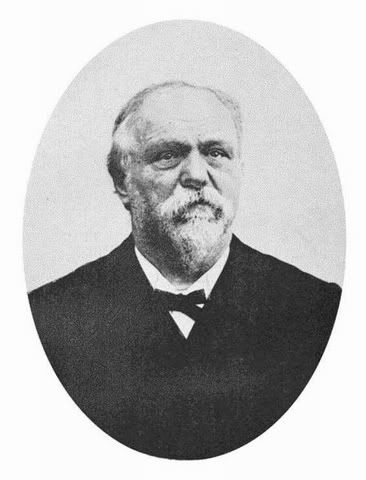
In the aftermath of the 1892 Revolution (or Rebellion depending upon whose history book you read) VSVR politics was massively altered. Inspired by the plight of the poor a new group arose around the French émigré Georges Sorel. The new movement, whose adherents called themselves the Revolutionaries, glorified the Rebellion as the first step on the road to the Second Revolution. In the Rhineland Revolution the proletariat had overthrown the bourgeoisie and aristocracy to establish themselves as a new ruling class – now it was up to the peasantry topple the workers and finally create an equal society in which the rural worker is worth as much as the urban worker. The Revolutionaries were in themselves coloured by peasant sentiment and called for an end to any and all anti-religious policies (another major root of the Rebellion and a policy that gave them support in the cities), a more German Republic and an end to the suppression of national sentiment (the Poles in particular wanted to keep their identity). The Revolutionaries demanded at the same time freedoms and the rolling back of reforms. They both demanded sanctions again the all powerful worker based papers and called for greater press freedoms. The called for greater unemployment benefits and safety regulations as well as a lower minimum wage and longer working hours.
The Revolutionaries were here to stay. They were immensely popular amongst the peasantry but still carried with them a powerful urban following. They were at the very least the third largest faction (competing with the Marxist-Leninists and Luxemburgists for dominance), likely even stronger.
Under Rosa Luxemburg's tenure the economy stabilised, the revolution expanded at a slow pace and the peasantry finally rose up against the workers' state.
When compared with what went before Luxemburg’s first tenure as Chairman was quite incredible for its stability. With Bernstein and Martov always pushing for peace and arbitration in international affairs relations with the capitalist world cooled significantly. Meanwhile economic problems started to die away. Rosa did benefit from seeing the late-Leninist stimulus of industry come through with increased capacity but the Council Communist method seemed to be a reasonable if unspectacular success economically but a major coup politically. Elsewhere the First International continued to expand abroad.

However Socialism did meet with failure during this period – most notably in the Bosnian War. In March 1890 the CSR declared war on the Republic of Bosnia with the aim of adding the country as a constituent Republic of the CSR. However, what should have been an easy victory, turned into a long and bitter struggle. The Bosnian Army did not once defeat the CSR forces in a pitched battle but using guerrilla tactics the Bosnians managed to hold the Turks back East of Sarajevo. Whilst the CSR struggle in combat its relationship with the VSVR was seriously strained. The aggressive action taken by the CSR was seen as a direct provocation of Russia and Austria-Hungary around the world and both Imperialist powers mobilised their troops. Neither Socialist Republic was ready for war with these two powers and the VSVR was forced to send out Zetkin on an emergency diplomatic tour to save Europe from war. Being seen as a dove in VSVR politics had always been a damaging thing and Luxemburg’s support for peace in the Bosnian Crisis severely damaged her position – allowing for a major bounce in Marxist-Leninist support. The VSVR (who had 24,000 men in the CSR) was not invited to support the Turks in Bosnia which prolonged the struggle. In January 1893 the CSR Army made a major breakthrough as it finally destroyed the Bosnian Army and brought Sarajevo under siege. Vienna replied to this by agreeing to an alliance with Bosnia and sending a large army in from the West. In July, with its Army retreating into the Bulgarian Republic, the CSR surrendered and agreed to a peace treaty.

Outside of the Comintern there were several major changes around the world. In July 1890 the 19 year old Emperor Guangxu was elevated to total power after a coup against the Dowager Empress Cixi by pro-reformists took place. Cixi was exiled and the reformists quickly set about adapting China. In December China overtook Mexico to take a place among the Great Powers of the World.
The rise of this new superpower provided a mixed reaction in the Comintern. Firstly it effectively ended hopes that the Socialist movement in Indochina could actually meet with meaningful successes, however there was a better chance of a communist movement growing in China if the country started to industrialise. In Realpolitik terms the new power was a good thing for the VSVR. Russian, British and American hopes of economic dominion over the innumerable consumers of China had ended and now Britain would have to place a much greater emphasis on India – loosening British interference West of Delhi.
Just as China arose as a major world player France went through yet more turmoil. The Second Republic had been formed in 1885 and in the Republic’s first elections the moderately liberal Republican Party achieved a majority in the French Parliament – allowing them to govern the country. Since then French industry had totally stagnated and many areas of the country had seen their factories close (unemployment was now rife in the Rhone Valley and the North of the country). At the same time both of France’s two main political parties (the Republicans and the French Workers’ League) had experienced splits. Firstly, and less severely, the Radical Party had been formed by members of the Republican Party who were unhappy about a perceived drift to the Right by the Republicans. As much as this was painful for the Republicans the FWL’s split was considerably more damaging. Despite calls from Cologne for less extremism in the Comintern the FWL had maintained its fiercely revolutionary principles and continued to hold a large supply of arms (which had been coming in from the VSVR under Lenin’s tenure). The extremism of the FWL frightened a large section of the French proletariat as well as many party members themselves. In 1888 the Socialist Party was formed by the moderate members of the FWL and many other socialists who had refused to join the FWL in the first place.

In the election of 1890 the FWL secured 30% of seats, the Republicans and Socialists both 23%, the Radicals 7% and the two Monarchist groups 17% between them. Initially the FWL had expected to form a coalition with the Socialists; however the Socialist Party shocked France by instead turning Right and joining with the two liberal parties to form the Popular Front (with 53% of seats). The new government alienated both Socialists and Republicans and terrified Right wingers who saw a swathe of social reforms passing through government and worse still a detente with the VSVR.
In September one ‘’Prince’’ Napoleon (son of the once influential Louis-Napoleon and heir to the Bonapartist dynasty) arrived at Calais from London to take charge of a military coup de tat that aimed to overthrow the Popular Front. The coup failed as the Bonapartists were unable to capture Paris (fended off by a mixture of local civilians and a few pro-government military formations). Despite failing to take Paris the Bonapartists were still able to bring the city under siege. Elsewhere the FWL, fearing a Bonapartist restoration and seeing a chance to take power, launched a colossal rebellion across France. In November Philip ‘’VIII’’ (son of the former King Philip VII) landed in the Vendee region (the heart of Legitimist support) with several thousand mercenaries and quickly cobbled together an army with which he marched towards Paris.

In early 1891, at the low tide of government power, virtually all of European France had been lost to one of the three rebel groups. When over 100,000 pro-government soldiers arrived from Algeria in March the tide began to turn swiftly against the rebels. The poor treatment of rural citizens by every rebel group helped had momentum to the government as they swept back the rebellions. By the end of 1893 France’s latest Civil War was over but the country remained war ravaged, hopelessly unstable and economically stagnant.
Elsewhere the Socialist International marched onwards. Frustratingly however Luxemburg’s term started with Algeria becoming the first ever country to leave the Comintern as pro-French Islamists overthrew the communist government and pledged their support to the French.

On September 15th 1891 the people of Chile awoke to a new, socialist, government as the communists won a landslide electoral victory. As mass VSVR support streamed into Chile Latin America seemed to finally be becoming the latest battlefield for the Great Powers. In the North both the USCA and USA were battling to gain influence in the recently deposed Great Power of Mexico. In the North of South America British influences from Venezuela competed with the USCA in breaking America’s extremely tenuous grip over Colombia. To the East French dominated Brazil was expanding its tentacles Westward – bringing it directly into conflict with the recently outstretching Socialist influences coming out of Chile. Finally Argentina was becoming a major battleground for the French, British and Comintern as each group fought hard to gain control over the agricultural breadbasket of the Pampas.
The VSVR met with a significant success in August 1894 when Bolivian Marxist revolutionaries deposed the pro-French military junta.

In 1892 and then January 1894 both the Greek and Omani people violently overthrew their Monarchs and established Socialist Republics.

At the end of Luxemburg’s term the Comintern had expanded by a considerable amount. The most crucial new additions were in Latin America where socialism had exploded in popularity thanks to major Comintern support for the parties there and the successes of Chile and Bolivia.
For everything that happened abroad Luxemburg was elected on internal affairs and her term was always going to be remembered by what occurred within the Republic.
In industry and in the cities Luxemburg’s policies were a flying success. Whilst unemployment lingered at a reasonably high level for some years it was finally eliminated once more in late 1893. New unemployment subsidies were also introduced. Meanwhile industrial growth figures (whilst comparatively low in terms of percentage growth) were impressive in gross increase in production. Better still industrial subsidies grew at their lowest rate since the 1860s. Also, the African Continent experienced its first native industries as in several cities across the West of the Continent saw small industrial sectors spring up – all this was done thanks to investments made by local Communes in Europe towards their African brethren (the state encouraged this redistribution of wealth southward but did not make it a mandatory policy).

The Republic was, of course, helped on in this period by technological development – most notably the spreading of electrification in the VSVR. On top of this several new industries started to spring up. In Hannover factories created synthetic dyes to reduce VSVR reliance on imports, in the Ruhr new factories created electric gears and in Africa oil refining became, by far, the largest factory based industry (Africa had the advantage of greater proximity to the major oil producing areas that European VSVR).

The new oil industries in Africa and Europe allowed the VSVR to become a sea faring nation once more as the first combat fleet of the Red Navy since the sinking of the steam ship based fleet by the British in the Eastern War was launched. The Fleet had initially been under construction in the early days of Lenin’s second term but a lack of funds and a strong supply of refined oil meant that the fleet could not be completed under Rosa’s tenure.
In terms of raw figures decentralised Council Communism was a decent, although unspectacular, success as has been discussed. In terms of popularity it was a great boon to the Luxemburgist-Democrat alliance. Within the cities at least the greater economic control over local fairs was greatly appreciated by the proletarians.
Hearing all this one might think that Luxemburg was the most popular Chairman ever. One would be mistaken.

For it was during Luxemburg’s tenure that the great mass of the disposed, downtrodden, ignored and vilified class of the VSVR finally unleashed their anger upon the state in the Peasant Revolution of 1892. At first look the Luxemburgist-Democrat government was the most pro-farmer in the history of the Republic. Had they not granted them the right to vote? Had they not given them great economic control in the Councils? In truth these concessions were things that the peasantry did not care about. Few really cared that they were now allowed to vote; the current government was still not elected with any rural input and even if it was it was still a government of the urban worker not his rural counterpart. Meanwhile the Council effectively gave the peasantry the right to do as they had done already – the collective farms already acted with significant local power, industry had always been the main target for centralisers. The vast majority of government funding still went to urban Soviets whilst the rural Soviets seemed to be given the scraps.
The primary source of the rebellion was the long standing VSVR policy of price manipulations which increased the value of industrial goods and decreased the value of food and other raw materials (rural goods). This essentially left the peasants with artificially low incomes and the workers with artificially high incomes. In the view of the farmer the state was robbing from the poor to give to the slightly less poor. Luxemburg’s rural concessions did as much to aggravate the farmers as to satiate them – in the view of the Party the peasant problem was no dealt with and their position as a major political issue seemed to have faded. What they really wanted was still being ignored.
The rebellion itself was simply a mass outbreak of fury at the inequalities of the socialist system. Concentrated in the East and South of the country around 200,000 farmers took part in the rebellion that lasted from January to March 1892 and cost the lives of almost 100,000 individuals.

In the aftermath of the 1892 Revolution (or Rebellion depending upon whose history book you read) VSVR politics was massively altered. Inspired by the plight of the poor a new group arose around the French émigré Georges Sorel. The new movement, whose adherents called themselves the Revolutionaries, glorified the Rebellion as the first step on the road to the Second Revolution. In the Rhineland Revolution the proletariat had overthrown the bourgeoisie and aristocracy to establish themselves as a new ruling class – now it was up to the peasantry topple the workers and finally create an equal society in which the rural worker is worth as much as the urban worker. The Revolutionaries were in themselves coloured by peasant sentiment and called for an end to any and all anti-religious policies (another major root of the Rebellion and a policy that gave them support in the cities), a more German Republic and an end to the suppression of national sentiment (the Poles in particular wanted to keep their identity). The Revolutionaries demanded at the same time freedoms and the rolling back of reforms. They both demanded sanctions again the all powerful worker based papers and called for greater press freedoms. The called for greater unemployment benefits and safety regulations as well as a lower minimum wage and longer working hours.
The Revolutionaries were here to stay. They were immensely popular amongst the peasantry but still carried with them a powerful urban following. They were at the very least the third largest faction (competing with the Marxist-Leninists and Luxemburgists for dominance), likely even stronger.
Under Rosa Luxemburg's tenure the economy stabilised, the revolution expanded at a slow pace and the peasantry finally rose up against the workers' state.
Sorry I didn't have this up earlier. I had just about finished this about 4 or 5 hours ago but had to go to engage in some celebrations. This means that the last 2 and a bit paragraphs were written in a very short space of time with me being reasonably drunk so don't expect much from them. Still they seem alright from here.
ciao.
ciao.
Yeah, so let's drop the subject?
Like a millionthed
*Clap! Clap! Clap!*
Turmoil is always good. It means the revolutionary spirit is not dead!
On a side note: With the Comintern staring to fracture and other gripes rising to the fore, wouldn't now be a great time for those "Democracy-terrorists" to start whisperin' in the peasants ear that they could have it all? No more price haggling. Equal voting. Positions given by merit, not by "communist-mindedness"...
Turmoil is always good. It means the revolutionary spirit is not dead!
On a side note: With the Comintern staring to fracture and other gripes rising to the fore, wouldn't now be a great time for those "Democracy-terrorists" to start whisperin' in the peasants ear that they could have it all? No more price haggling. Equal voting. Positions given by merit, not by "communist-mindedness"...
Suicide?
Call it freedom of death.
State cannot force people to live long.
Why let anyone suffer for too long?
Let nature rule, survival of the fittest and strongest.
We cannot change our nature.
We cannot control progress.
Everyone is here to die.
Call it freedom of death.
State cannot force people to live long.
Why let anyone suffer for too long?
Let nature rule, survival of the fittest and strongest.
We cannot change our nature.
We cannot control progress.
Everyone is here to die.
On a side note: With the Comintern staring to fracture and other gripes rising to the fore, wouldn't now be a great time for those "Democracy-terrorists" to start whisperin' in the peasants ear that they could have it all? No more price haggling. Equal voting. Positions given by merit, not by "communist-mindedness"...
This is basically the Revolutionary faction I just introduced. Go Sorel!
Suicide?
Call it freedom of death.
We agreed to drop this/
We agreed to drop this/
Hard. Late 19th century, industrial revolutions brings more suffering to the lower classes, even though we as 'socialists' govern for their best.
The church has been wiped, there is are moral guidelines that everyone is to follow.
Everything that is new, is revolutionary and means progress.
Science leaps forward, new doctrines arise; there will be debates over 'good-life' and 'good-death', just as well about anything new that has not been invented so far; or has been suppressed in bourgeoisie states.
Euthanasia is nothing bad nor good, it is.
It is a word, and it can bring great joy to people that really suffer.
What are we to judge others?
Are we not free to choose?
What prevents freedom of thought and freedom of life and death?
Oh dear sweet...
I can just see this massive announcement laughing as it tramples over my AAR's tiny two-vote lead.
@ Enewald: Personally I'm very much in favour of people having the choice of whether or not they wish to continue to live. However, all this talk of forced euthenasia and a culture of suicide is certainly not cosher. I'd prefer if the conversation ended here and now.
Personally I was hoping Luxemburg would emancipate the Jews... Just for the sake of pissing off the Anti-Semites
They aren't led by a Bismark, but that's fine.
- Status
- Not open for further replies.

